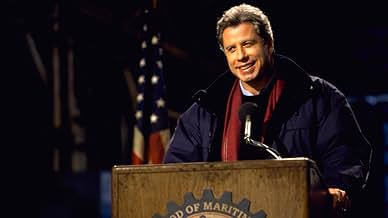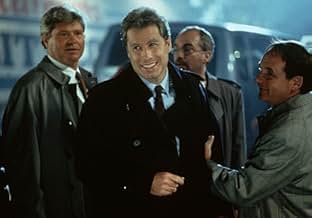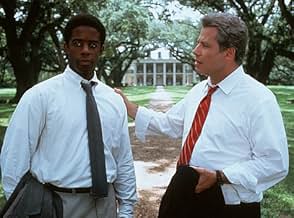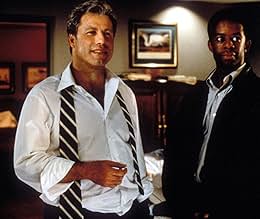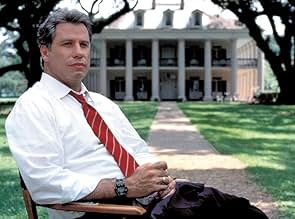A man joins the political campaign of a smooth-operator candidate for President of the United States of America.A man joins the political campaign of a smooth-operator candidate for President of the United States of America.A man joins the political campaign of a smooth-operator candidate for President of the United States of America.
- Nominated for 2 Oscars
- 10 wins & 31 nominations total
- Director
- Writers
- All cast & crew
- Production, box office & more at IMDbPro
Storyline
Did you know
- TriviaThen-President Bill Clinton enjoyed this movie so much that he even invited John Travolta to a party, on one condition, he must come as Governor Jack Stanton. Travolta declined.
- GoofsWhen watching the New Hampshire returns, one TV station says that Governor Stanton is still out campaigning on the street until the polls close while the other simultaneously says 15 percent of the vote has already been counted. Votes aren't counted until after the polls close.
- Quotes
[with a gun in her enemy's crotch]
Libby Holden: I am a gay lesbian woman! I do not mythologize the male sexual organ!
- SoundtracksPrimrose Lane
Written by Wayne Shanklin and George 'Red' Callender (as George Callender)
Featured review
The much under-rated Primary Colors represents the zenith of its genre: a consistently excellent political satire armed with a stellar cast, an involving, intricate plot, and some of the finest direction in recent times from the sporadic (yet always reliable) Mike Nichols. John Travolta's portrayal of a Clinton-esquire Southern governor with a weakness for women and doughnuts is note perfect, encapsulating the flawed yet undoubtedly brilliant Jack Stanton with effortless flair and charisma. Travolta is ably supported by English character actors Emma Thompson and big screen debutant Adrian Lester, as well as an Oscar nominated Kathy Bates, Billy Bob Thornton and a resurgent Larry Hagman.
The film is, in essence, a chronology of Stanton's rise of the political ladder and the struggles encountered by his vibrant team in keeping their man in the race, despite numerous setbacks and tragedies along the way. The script gives Travolta a perfect platform to express the very human emotions that both constrain and encourage us: his early speeches (particularly at an adult literacy centre) are punctuated by salient (yet entirely falsified) anecdotes, and were are given equal insight into Stanton the man and Stanton the politician. Thus the film's fundamental paradox arises: the audience is clearly conditioned to sympathise with Stanton as a result of his remarkable eloquence, yet we are frequently undercut by revelations of sex scandals, endless untruths and the often heartless pragmatism he embarks upon. This conflict for the audience is superbly manipulated so that, at the film's conclusion, we are unsure as to what our own emotions should be. Few films manage to pull this off: fewer with the nuanced skill of Nichols' political odyssey.
I want to add a few words about the female performances in the film. Emma Thompson, as the Hilary Clinton of the the cast, nails both the accent and mannerisms of her model with a convincing determination. Her character is often the mediator among the campaign team, yet there is a ruthlessness about her, a quiet conviction in her actions that her husband is clearly sustained by. Kathy Bates is the unhinged lesbian media consultant who is drafted in to nullify the potent threat of negative media reporting. She clearly gets all the best lines (a prize shared with the equally crazy Billy Bob Thornton character) including a memorable reference to Stanton's string of lovers as "sorry trash bins": scrupulous editing on my part here. At the film's conclusion, Bates comes to the fore, spelling out the impossible conflict between what is politically right and what is humanly right with an intensity that few actors could accomplish. Her subsequent Oscar nomination was well deserved and she was unlucky to be pitted against a triumphant Judi Dench in the Best Supporting Actress category.
That said, this is Travolta's movie. This is a career-defining performance from an actor unfortunately sullied by a series of mind-numbing duds (Battlefield Earth, anyone?), yet had he chosen his roles more wisely (as, say, Pacino has done) a more creditable media image would most certainly have been forthcoming.
Don't be put off by its subject matter: this is film making at its best and is a credit to its highly talented cast and crew.
10/10
The film is, in essence, a chronology of Stanton's rise of the political ladder and the struggles encountered by his vibrant team in keeping their man in the race, despite numerous setbacks and tragedies along the way. The script gives Travolta a perfect platform to express the very human emotions that both constrain and encourage us: his early speeches (particularly at an adult literacy centre) are punctuated by salient (yet entirely falsified) anecdotes, and were are given equal insight into Stanton the man and Stanton the politician. Thus the film's fundamental paradox arises: the audience is clearly conditioned to sympathise with Stanton as a result of his remarkable eloquence, yet we are frequently undercut by revelations of sex scandals, endless untruths and the often heartless pragmatism he embarks upon. This conflict for the audience is superbly manipulated so that, at the film's conclusion, we are unsure as to what our own emotions should be. Few films manage to pull this off: fewer with the nuanced skill of Nichols' political odyssey.
I want to add a few words about the female performances in the film. Emma Thompson, as the Hilary Clinton of the the cast, nails both the accent and mannerisms of her model with a convincing determination. Her character is often the mediator among the campaign team, yet there is a ruthlessness about her, a quiet conviction in her actions that her husband is clearly sustained by. Kathy Bates is the unhinged lesbian media consultant who is drafted in to nullify the potent threat of negative media reporting. She clearly gets all the best lines (a prize shared with the equally crazy Billy Bob Thornton character) including a memorable reference to Stanton's string of lovers as "sorry trash bins": scrupulous editing on my part here. At the film's conclusion, Bates comes to the fore, spelling out the impossible conflict between what is politically right and what is humanly right with an intensity that few actors could accomplish. Her subsequent Oscar nomination was well deserved and she was unlucky to be pitted against a triumphant Judi Dench in the Best Supporting Actress category.
That said, this is Travolta's movie. This is a career-defining performance from an actor unfortunately sullied by a series of mind-numbing duds (Battlefield Earth, anyone?), yet had he chosen his roles more wisely (as, say, Pacino has done) a more creditable media image would most certainly have been forthcoming.
Don't be put off by its subject matter: this is film making at its best and is a credit to its highly talented cast and crew.
10/10
- philblyghton
- Jan 5, 2005
- Permalink
- How long is Primary Colors?Powered by Alexa
Details
- Release date
- Countries of origin
- Official site
- Languages
- Also known as
- Màu sắc chính trị
- Filming locations
- Production companies
- See more company credits at IMDbPro
Box office
- Budget
- $65,000,000 (estimated)
- Gross US & Canada
- $39,001,187
- Opening weekend US & Canada
- $12,045,395
- Mar 22, 1998
- Gross worldwide
- $52,090,187
- Runtime2 hours 23 minutes
- Color
- Sound mix
- Aspect ratio
- 2.35 : 1
Contribute to this page
Suggest an edit or add missing content



